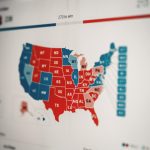Republican senators are firing back at the Biden administration’s decision to slap more tariffs on Chinese electric vehicles, accusing President Joe Biden of prioritizing his green agenda over American automakers. Senator J.D. Vance from Ohio and Senator Marco Rubio from Florida did not hold back in their criticism, calling out the administration for causing harm to the U.S. auto industry.
Vance slammed Biden’s electric vehicle mandates as a “catastrophe” for American autoworkers, pointing fingers at the administration for its far-left environmental policies. He confidently declared that once Donald Trump is back in the White House, the American auto industry will bounce back stronger than ever.
Republican senators slammed the Biden administration's announcement Tuesday of increased tariffs on Chinese electric vehicles as being more about President Joe Biden's attempt to bolster his green agenda at the expense of U.S. automakers.
… https://t.co/fOn9aTbvCt #Trump2024 pic.twitter.com/ehBylbGbhY— JPNWMN (@JPNWMN) May 15, 2024
Rubio, known for his tough stance on China, highlighted the delayed implementation of the tariffs, emphasizing that American manufacturers have long been at a disadvantage due to unfair Chinese competition. He urged the administration to reconsider its decision and take into account the threats posed by both Chinese electric and combustion engine vehicles.
The Republicans also expressed skepticism about the selective nature of the tariffs, questioning why only Chinese electric vehicles were targeted while other products were left untouched. They argued that Biden’s push for electric vehicle dominance by 2027 would do more harm than good to the U.S. auto industry.
Former President Donald Trump, a vocal critic of Biden’s policies, and his campaign team echoed similar sentiments. Trump insisted that China’s advantage in various industries posed a threat to American interests, calling for broader tariff measures. His press secretary criticized the administration’s focus on electric vehicles at the expense of gas-powered cars, accusing Biden of imposing unnecessary burdens on American consumers.
In addition to the tariffs on electric vehicles, the Biden administration also imposed tariffs on Chinese medical equipment. However, American manufacturers like Scott Maier of Blue Star NBR dismissed these measures as insufficient, lamenting that China had already solidified its dominance in the U.S. market.
As tensions escalate between the U.S. and China, the prospect of a trade war looms large. With the 2024 election on the horizon, the Biden administration faces mounting pressure to recalibrate its trade policies. The political landscape is intensifying as both parties clash over the best course of action in dealing with China’s economic influence.
In conclusion, the rift over tariffs on Chinese goods underscores the deep-rooted divisions within American politics. Republicans are staunchly opposed to Biden’s approach, citing concerns about the impact on domestic industries and national security. As the debate rages on, the future of U.S.-China trade relations hangs in the balance, with both sides jockeying for advantage in a high-stakes game of economic brinkmanship.




